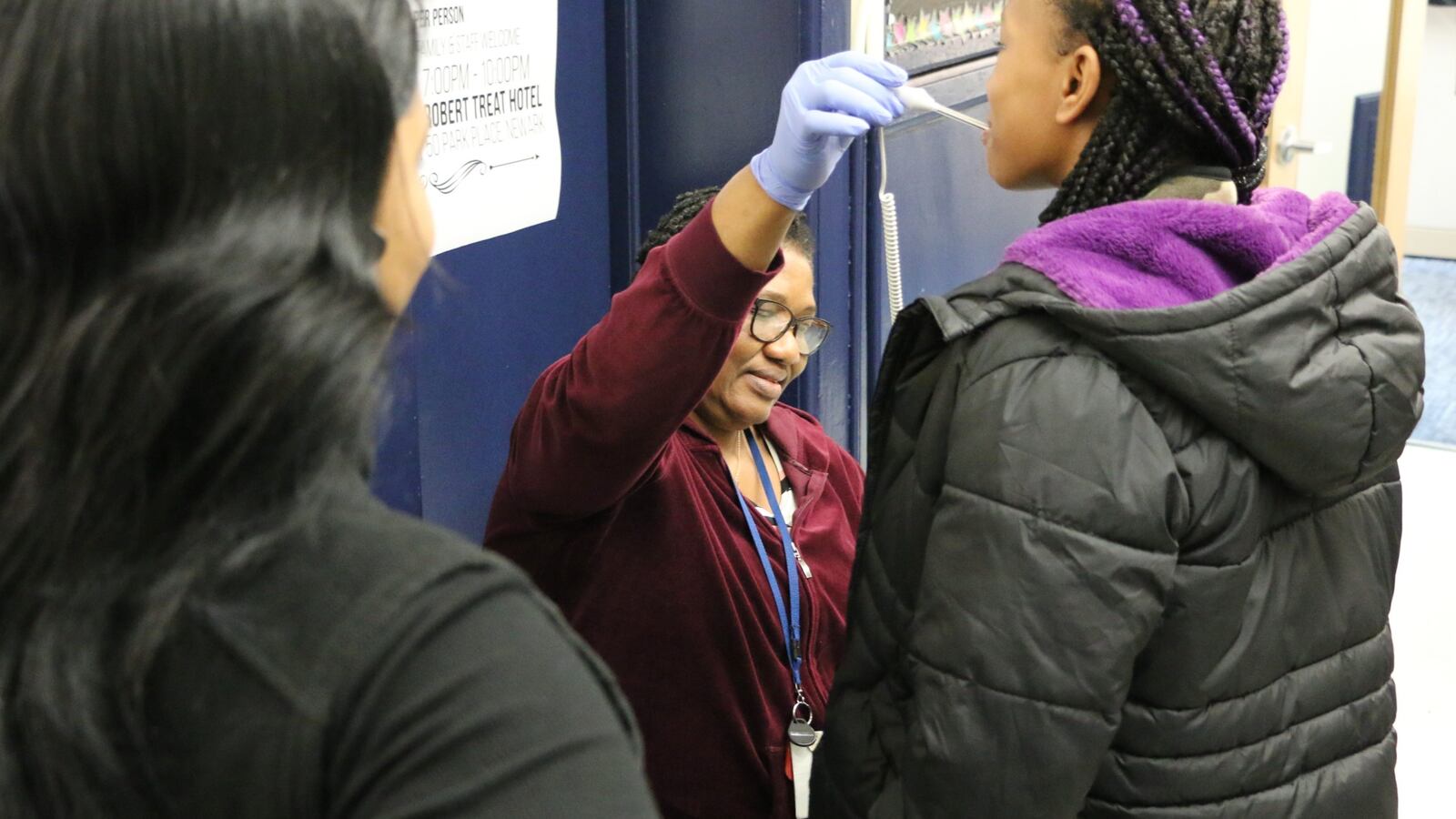In Newark and cities nationwide that are racing to contain the new coronavirus, families woke up Monday to a new reality where schools are shuttered and homes are transforming into makeshift classrooms.
Across the city, parents picked up bagged lunches and lesson packets from designated schools before hurrying back home. Teachers made plans to keep in touch with students by phone or electronically, while schools hoping to offer online lessons scrambled to coordinate the complex logistics — all with little planning or precedent to guide them.
At Great Oaks Legacy Charter School’s campus in the South Ward, a nurse took Maria Williams’ temperature — along with all other visitors’ — before she entered to collect work packets and grab-and-go lunches for her children.
Like other parents, Williams believed the coronavirus pandemic warranted school shutdowns even as she worried that they could end up stretching far longer than the planned two weeks. But on the first day of the school closures, parents and educators alike had little time to contemplate the future as they scrambled to adapt to a profoundly altered present.
“It’s just taking it hour by hour and day by day,” Williams said.
The virus, which causes a respiratory illness called COVID-19, has torn through the U.S. and New Jersey. By Monday, there were at least 178 confirmed cases in the state, up from 50 just three days earlier. The rapid spread has prompted a rapidly evolving response: Within a week, Newark and other districts pivoted from a focus on cleaning buildings and promoting hand washing to canceling all classes, as the district announced late Friday. Most city charter schools followed suit, and, on Monday, Gov. Phil Murphy ordered any New Jersey schools that remain open to close within two days.
Even as most parents welcomed the decision, it also upended their daily lives.
Working parents suddenly had to find child care or stay home just as the virus was threatening some parents’ livelihoods. Fatima, a Newark mother of three young children who does accounting through a temp agency, said the agency stopped sending her to jobs during the outbreak. The loss of work means she’ll be able to care for her children while schools are closed, but it also leaves the family in a precarious economic situation.
“The finances are the only problem,” said Fatima, who asked that only her first name be used. “It’s really going to affect us because there’s no income coming.”
The state Assembly on Monday approved a package of bills to assist people impacted by the new coronavirus, including one that would provide unemployment compensation to people who lose wages because they test positive for the virus, must care for an infected person, or have to stay home with a child whose school was closed.
Parents who are able to stay home with their children face a different challenge: how to run a temporary homeschool.
They have help from the Newark school district, which created thick packets for students in every grade level with 15 days of assignments. (Many charter schools did the same.) At some district schools, teachers and administrators came in over the weekend to sort the packets and distribute them to parents. Families can also pick up the packets at the meal sites, as many did on Monday.
Many teachers have also promised to answer parents’ questions during the closure and check in on students by phone, email, or educational messaging apps, such as ClassDojo.
Tabias Scott said his children’s teachers at Belmont-Runyon called to remind him to pick up the packets and gave him classroom advice. For instance, they told him to make sure his kindergartener practices her “sight words,” which young children must learn to read automatically, and to ask his children to stop whatever they are doing and read each afternoon. Because he works a night shift, Scott said he’ll be able to assume the role of teacher during the day to ensure his children complete their assignments.
“I’m going to make sure you still understand that school is still in session,” he said. “This is not vacation.”
Other parents plan to lead by example. Bridget Cruz said she will be able to work at home alongside her two children, who are in middle school at Belmont-Runyon, because the community college she attends temporarily cancelled its classes.
“We’re all going to do homework at the same time,” she said. “I do homework, you do homework.”
Some parents are looking online for home learning tips. Jennifer Early, whose son is in kindergarten at Wilson Avenue School, said she had been reading Facebook posts by parents in other countries who have been quarantined with their children.
“We’re just starting this pandemic,” she said. “They’ve been going through it for months.”
Great Oaks Legacy, which enrolls some 1,800 students across several Newark campuses, sent home assignment packets for students to complete during the closure. It hopes to supplement that with online learning in the coming days, said Jared Taillefer, the charter network’s CEO.
The goal is for students to complete online activities using programs the school has already employed for homework and some assessments, he said. Tutors who are placed in the network by AmeriCorps will use Google Hangouts to chat or video conference with students, and high school teachers will use Google Classroom to post assignments and videos.
To pull that off, teachers and tutors were calling every family on Monday to ask whether they have access to a home computer and internet. The school will give out Chromebook laptops to students who need them, and it is contacting internet providers to ask if they will provide access to families who lack it. Meanwhile, social workers will call families to check how everyone is holding up.
“It’s a work in progress,” Taillefer said. “We’re all doing the best that we can.”

